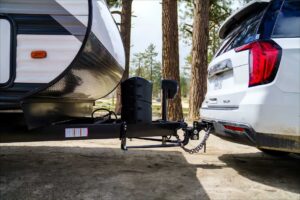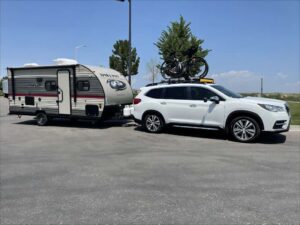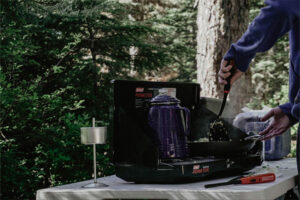
Where can I find my Vehicles Towing Capacity?
Begin your search for the ideal trailer for your car in the glove space, where most vehicle owner’s manuals are kept. Look for “Vehicle Towing Capacity” in the handbook. This is the manufacturer’s specification for the vehicle’s towing capacity. Choosing a trailer that exceeds your vehicle’s towing capability will put the engine, gearbox, and brakes to their design limitations.
While reading the car owner’s handbook, keep an eye out for the Gross car Weight (GVW). The GVW is the actual weight of your automobile or truck. Next, search for the Gross Vehicle Weight Rating (GVWR). The GVWR is the weight of the vehicle plus the maximum load it can safely carry. Smaller, lighter cars are not designed to tow at all, and that will be stated in the owner’s manual.
Where can I find the weight of an RV/Trailer?
As you continue your search for a trailer to pull with your car, look by the numbers. First, find the “Gross Trailer Weight” (GTW). The GTW is the trailer’s weight when completely loaded, which includes your gear, food, and filled fresh and gray water tanks. On bigger RVs, look for the Gross Vehicle Weight Rating, which specifies the maximum weight that the camper and its cargo can transport.
While trailer purchasing, you may also come across the term “Base Curb Weight” (BCW). The BCW is the weight of the trailer as delivered, including factory equipment and all necessary lubricants. Some vendors may also promote the “Dry Weight” of an RV, which is the weight when it is empty and not fully equipped. These are useful data, but they should not influence your purchase decision because you would never pull an empty trailer or RV.
Unless the trailer you’re looking at is handmade, it will have a Vehicle Identification Number (VIN) plate attached someplace. The plate will show the trailer’s serial number as well as its loaded and empty weights. The GVWR of an RV may be found on its specification sheet.
Tongue Weight
Tongue Weight (TW) is the downward pressure that the tongue of a fully loaded trailer exerts on your vehicle’s hitch ball. A properly loaded trailer’s TW should be roughly 10% of its loaded weight. The Tongue Weight contributes to the Gross car Weight of your car.
Adding it up
When you combine the weight of your car, GVW (including the tongue weight), to the GTW of the trailer or GVWR of the RV you’re contemplating, make sure the total does not exceed your vehicle’s Gross Combination Weight Rating. This is the maximum total weight that your automobile or truck can safely carry.
Cars and Trailers That Can Tow a Trailer
Compact and subcompact cars are best towed behind an RV rather than as the tow vehicle, while a few are capable of pulling up to 2,000 pounds with the right towing kit. If your small car is capable of towing, seek a trailer with its electrical braking system to reduce wear and strain on the vehicle. Consider lightweight teardrops, micro-campers, or the tiniest and lightest utility trailers.
A mid-size car, certain family minivans, or smaller SUVs can often tow up to 3,500 pounds, as well as a tiny, lightweight camper, pop-up trailer, very small boat on a trailer, or utility trailer.
To get you started, here are some of the most common towing vehicles!
- Ford F-150
- Chevrolet Silverado 3500HD
- Ram 3500 Heavy Duty Pickup
- Nissan Titan
- Jeep Renegade
- Hyundai Santa Fe
- Chrysler Pacifica
- GMC Terrain
- Honda CR-V
compact to mid-sized pickup trucks and certain heavier SUVs, depending on the make and model, may be able to tow a bumper-pulled family camper, boat trailer, or compact toy hauler. All-wheel drive and four-wheel drive cars have a higher towing capability than equivalent two-wheel drive vehicles.
When selecting the best towing vehicle, horsepower is also a significant consideration. It is crucial to realize that you will also require a significant amount of torque to move the weight. (Horsepower keeps it moving and determines how quickly you can move.)
Many bigger travel trailers, fifth wheels, and toy haulers can weigh more than 12,000 pounds when completely loaded, necessitating the use of a higher duty truck with towing capabilities.
Conclusion
It is critical to perform the math before purchasing a trailer or RV. Towing more than your car can manage can result in dangerous and costly issues such as brake failure, blown tires, a damaged suspension, or an overheated powertrain.







